So you got a puppy. Congratulations! It’s going to be a fun few months.
Unfortunately, you’re going to have a few rough nights when your puppy is learning how to sleep by himself.
Many new puppy owners are surprised to learn that puppies don’t stay asleep all night long, but it’s a good goal to shoot for.
The puppy’s age and maturity level will play a big part in its ability to sleep through the night; most puppies sleep through the night between 18 and 30 weeks of age. You can, however, take some steps to help your puppy sleep through the night more soundly—and stay asleep—through the night.
Puppies can sometimes bark or whine while they're sleeping.
This is normal behavior, in fact, according’s good for them. If your puppy is always barking and whining at night, don't panic; it just means he's working on potty training or sleeping well through the night.
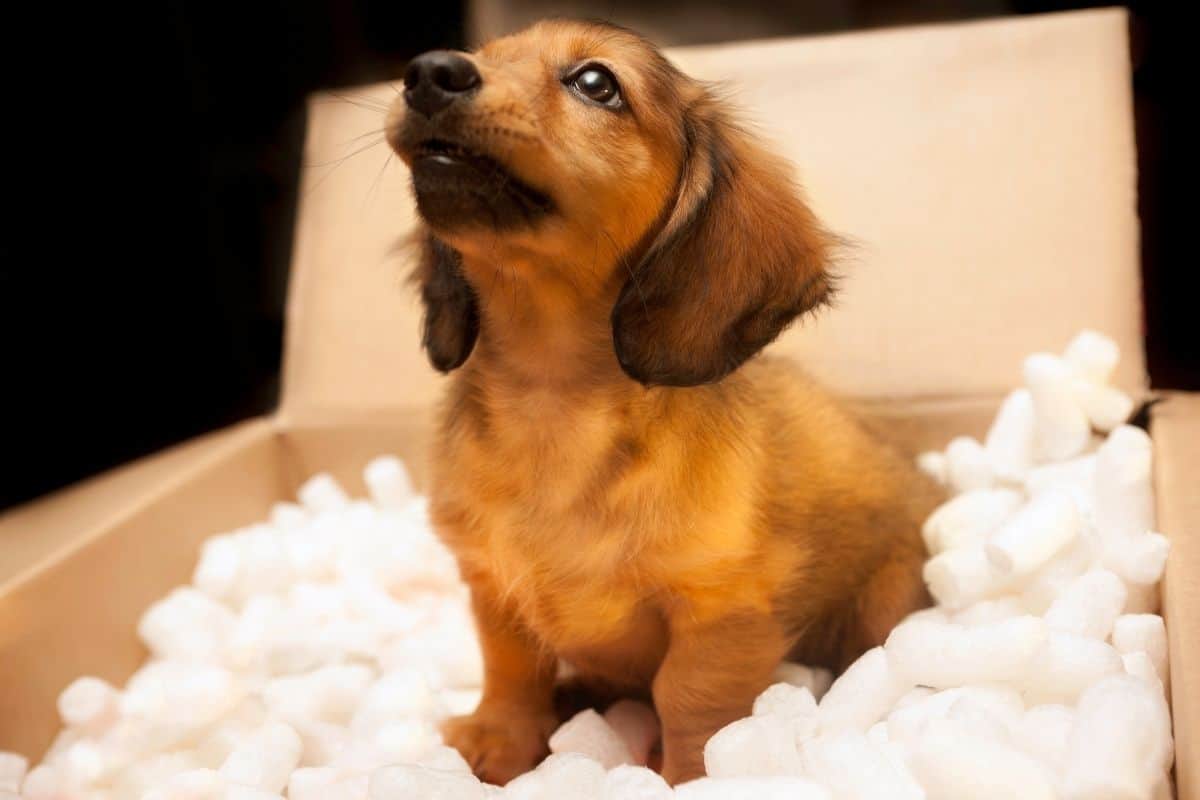
The Ultimate New Guide to Your Puppy Sleeping Through the Night
It's almost as hard to get a puppy to sleep through the night as it is for a small child.
The good news is that your puppy will sleep through the night before you know it. With a little foresight, planning, and an ongoing commitment, you can have your puppy sleeping through the night in a few weeks while at the same time training your new puppy.
Your Puppy's Natural Sleep Cycle
Most animals sleep in phases. They sleep a lot and you'll see that in the naps they take throughout the day.
Research shows that dogs sleep 12 hours a day on average, which is about the same amount of time as they are awake. Did you know that dogs sleep differently depending on their breed and age?
Giving your puppy plenty of exercise
One of my favorite sayings is, “A tired puppy is a good puppy!”
Similarly to tiring out an energetic child, by exercising your dog several times a day, this can lead to a night of uninterrupted rest.
Depending on size and breed, your dog needs at least 30-45 minutes of exercise a day.
The bigger your dog, the more exercise it needs. There's nothing better than a long walk for your dog before bed to ensure a restful night's sleep.
You and your puppy can sit on the floor and play with age-appropriate activities and toys. I like the Kong Puppy Dog toys.
Toys and activities will help you bond with your puppy and burn some energy.
Disclosure: Some of the links in this article are affiliate links (Amazon Associate or other programs we take part in). As an Amazon Associate, I earn a small commission from qualifying purchases.
Helping Your Puppy Burn Pre-Bedtime Energy
Exercise is one of the key ingredients to a healthy lifestyle, and this is especially true for puppies, who need to burn off their extra energy before they go to bed.
Playing games are simple to incorporate into your dog's daily routine, and will give your puppy plenty of chances to keep challenging themselves, after you've walked the dog, played fetch, and done all the rest.
Exercise and mental stimulation will help your puppy sleep better at bedtime.
You need to pick your puppy’s physical activity activities carefully before bed. For some puppies, high-energy activities can lead to over-stimulation.
Walking your puppy before bed is a great way to burn off some energy, as long as he's vaccinated to go outside.
Puppies need physical and mental exercise, so giving them interactive toys and puzzles helps them wind down and de-stress.
By providing enrichment activities throughout the day, you will allow them to express natural instincts like chewing or digging.

Prepare your Puppy's Sleeping Environment
It helps to make sure your dog has a comfy place to sleep. Using a snuggle puppy when you're first bringing your puppy home will help it feel at home.
With a good dog bed and a warm blanket, your dog will sleep better in no time. You can also play some soft music to help your dog fall asleep.
For example, a ticking clock or white noise from the radio. I used an Amazon Dot and played soft country music. Also, limit outside noise and bright lights in the room they sleep in. A sheet or cover over their kennel can help to keep a puppy calm.
Establish Your Puppy's Bedtime Routine
For example, they should have their evening meal a few hours before bedtime, some time to chew on an appropriate toy for decompression, repeated potty breaks to make sure they have emptied themselves, and then a calm entrance into the crate for sleep.
Your Puppy’s Eating and Drinking Schedule At Bedtime
Unless your puppy needs a lot of water for medical reasons, remove their bowl one hour before bedtime.
Puppies need to go potty about 10 minutes after drinking water. If they drink water before bed, their little bladders will get full and they'll need to go to the bathroom in the middle of the night.
Before you put your puppy to bed, have him finish his last meal of the day three to four hours before bedtime.
This will give them plenty of time to digest their food and pee before bed.
Taking your Puppy Pee and Poop Before Bed
When puppies go outside, sometimes they get distracted by what they see and hear and forget what they're out there for.
A puppy that's "empty" will sleep a lot more than one that has to go.
A Puppy's Need to go Potty at Night
Your puppy might whine or bark at night because it needs to go outside. This is common for puppies up to four months of age.
This usually begins as restlessness or movement around the crate before your puppy whines. You should absolutely respond to this kind of vocalization since a puppy could have an accident inside its crate or even the house. Accidents inside a puppy's crate can seriously hinder their house training.
To stop this from becoming a problem, set an alarm to wake them up every few hours when they are still young and take them outside every few hours. At about 18-30 weeks they should sleep through the night.
Proactive training is the best for dogs. Gradually, you can extend the time between alarms until you can sleep for 6 to 7 hours without taking a bathroom break.
Middle-of-the-night Potty Breaks
Puppies simply can’t hold their urine for more than a couple of hours physically, because their bodies aren’t built that way. They also don’t like to be forced to sit or sleep in their own mess, and I can't blame them. Both things mean you have to wake up in the middle of the night to let him out if you've started crate training.
Unless your dog is tiny, a good rule of thumb is that puppies can hold their bladder for about three times the number of months they are old. Just like kids, they might hold it a little longer overnight if they're exhausted, but you can bet they won't be able to make it until the next day.
When taking your pup on a potty break, don't engage in any play or excessive snuggling.
Give them something to chew on.
Chewing is great for calming your pup; even more so when they are teething!
Some people give their dogs cookies or chewy/bites before bed, like Nylabone Healthy Edibles Puppy Lamb and Apple Dog Bones.
I suggest getting a toy with no squeakers. A puppy toy in the crate will keep them busy as well if your puppy wakes up early.
Distress Barking
This sort of whining, barking, and howling is common with puppies who are still new to the family. It takes puppies a while to adjust to the new environment and routine, and it’s normal for them to be stressed.
Going from sleeping closely with their mom to sleeping by themselves is a big deal, and something most puppies have trouble adjusting to their new surroundings.
The signs of distress barking include high-pitched, constant barking or howling, or extended periods of whining. You might also see this in association with your puppy pacing in the crate, attempting to escape the crate, panting, or excessive licking.
If your puppy is stressed out, you can and should comfort them. The important thing here is that you are comforting, not coddling your puppy.
- Speak soothingly to them and praise them when they have been calm.
- Sit next to the crate to encourage a feeling of security and safety.
- If possible, don't let your dog out completely, because that might inadvertently teach that barking gets them out of the crate.
- Sometimes, petting your puppy while it's inside the crate may help the puppy go to sleep.
- If you want them to feel more secure, move their crate closer to you.
- Moving their crate into the bedroom next to you works really well and helps your puppy feel safe.
Demand Barking
Many puppies learn the noise they make in the crate makes you come over and let them out. Demand barking is a repetitive behavior, and your puppy is looking towards you intently.
This happens when owners take their pups outside to the bathroom when they hear them making noise at night. By being consistent and proactive at night, you can avoid creating such an association for your pup.
During crate training, pay attention to timing when you let your puppy out of their crate. Wait for a minute before you open the door. This is also a great chance to practice your puppy's quiet command.
If your puppy doesn't need a potty break and is barking at night, you have options. Ignore the barking for a brief period to see whether they stop. I only wait a minute or two to see if my puppy settles on their own.
Mark your dog's quiet time with a “yes” and give them a safe and appropriate toy or chew in their crate. Consider if they really DO need a potty break!
Evaluate their crate setup and if anything needs to be changed. Do they bark because they're too hot (or too cold) in their bedding or surroundings (like the heat vent or drafty window)?
Before letting them sleep in their crates, determine whether they need more physical and mental exercise.
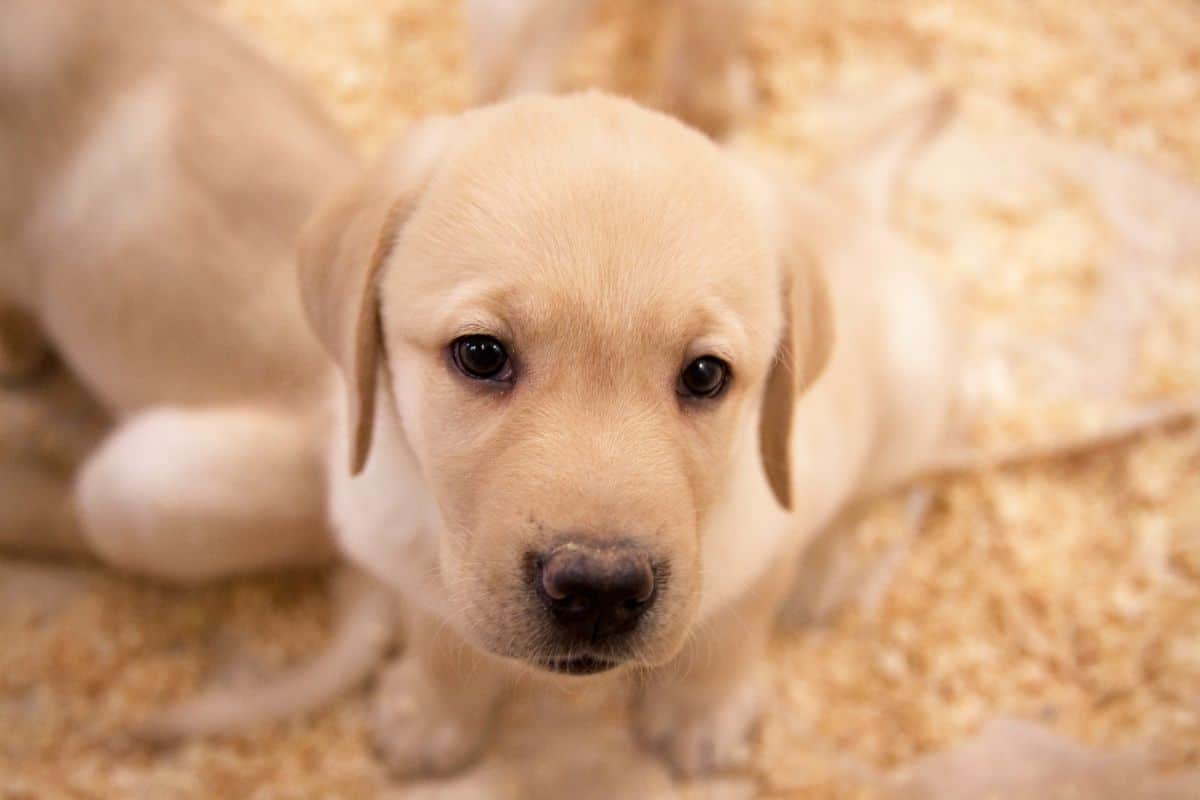
How to Make Sure Your Puppy Sleeps Through the Night
Despite their energy, puppies sleep 18-20 hours a day. One moment your puppy is a mini tornado, the next he's sleeping soundly.
Sleep is a vital part of healthy growth, allowing him to build his nervous system, brain, and immune system. All that sleep also helps him through growth spurts.
Puppies are energetic when they're awake because they're growing physically, meeting new people and places, and learning what they can and cannot do.
Since they live in such a stimulating, exciting world, they won’t always pay attention to an internal clock telling them it’s time to rest. It helps to stick with a daytime nap schedule and nightly bedtime.
Tips for Helping Puppy Get Daytime Sleep
It's hard not to cuddle him and let him sleep in your lap, but you don't want him to become dependent on you. Household members, including children, should learn to leave your puppy alone while your puppy is sleeping. But make sure you watch him because when he wakes up, he'll need to go outside.
Show your pup where to sleep. If he sounds sleepy, let him nap in his bed.
A crate, a dog bed, or some place quiet where he can nap without being disturbed. It may take a while, but eventually he'll figure out that's where he should sleep.
Make sure that his active time is followed by quiet time to sleep. He'll probably be sleepy after playtime or a walk. You puppy might nap every hour or sleep as long as two hours. All that sleep is fine.
No matter how much fun you have, make sure he doesn't get too tired. A lot of stimulation and exhaustion can cause unacceptable behavior. Encourage your dog to wind down in his cage or in his sleeping place.
Tips for Helping Your Puppy Sleep Through the Night
Never buy an expensive dog bed for a new puppy because he'll chew it up. Line the bottom of a crate with a soft, felted, cheap blanket or two.
Be careful with wool blankets or mats that can be chewed into long strings causing choking.
Keep a soft toy or baby blanket in the crate that smells like the pup's mommy. Many people put their puppies crates in their bedrooms so they feel close to their family.
By starting him on a sleep schedule, you'll teach him to become a better sleeper, and you'll both sleep better.
Don't let the pup eat or drink for a few hours before bedtime. Play with him, cuddle him, and don't forget to take him outdoors to relieve himself.
Keep his sleeping area quiet and dark.
If you watch TV in bed, turn down the volume and keep the light low. If your room gets lots of daylight in the morning, use blackout shades. He'll know when it's time to sleep, when it's quiet and dark. If your wire crate isn't dark enough, you can cover it with a cover.
Make sure your puppy gets plenty of physical and mental exercise during the day. Reward him by putting a treat in his crate. While he’s learning, expect some whining, barking, and howling before he settles in for the night.
Just like humans, puppies don't always sleep through the night. During the night, your puppy might need to go potty.
If he’s sleeping in a crate in your bedroom, you’ll be able to respond if he needs to go out. Calmly walk him outside, praise him quietly when he's done, and put him right back in his crate for sleeping.
Your Puppy’s Sleep Schedule
Puppies like structure and routine. Along with a feeding schedule and house training routine, a sleep schedule will help you and your puppy adjust to living together.
Your Puppy's Evening Schedule
Make sure your pup gets an excellent dinner and gets a Kong to chew on while you eat.
After dinner, go for a walk.
Let him play and hang out with family members.
Before bed, take him to the bathroom and then put him in his crate so he can sleep.
Don't let a schedule scare you. It may seem like a lot of work, but you will reward yourself with a happy, healthy dog, and you will come to enjoy the routine, too. It's the right time to develop the connection and love that will last a lifetime.

Prepping Your Puppy for Bed
Just like you may brush your teeth before bed or read to your kid before bed, having set routines with your puppy can help prepare him for sleep and give him something to associate with bedtime.
If your puppy is hyped up at night, it might be because he doesn't get enough stimulation during the day.
Try Soothing Sounds or Music
Playing classical music or any other low calm music can help calm your puppy so he doesn't whine and get anxious while you're not there.
I used an Amazon Dot and used to play country music on a low setting around my pups sleeping area. Just the sound of music helped both my dogs to sleep.
Your Puppy Needs Familiar Objects
Put a t-shirt or something with the scent of the house or environment your puppy came from next to him while he sleeps. When picking up your puppy, take a snuggle puppy or blanket and rub it on your pup’s litter mates and their current bedding before bringing them home.
Letting them sleep with this article or toy will go a long way to helping them relax those first few weeks in their new home environment.
It will help him feel at home in his new home. You can also send him a toy before he gets to his new home.
Over the next few days, the smell will gradually dissipate, which lets him familiarize himself with the smells around your home.
Crate Your Puppy Overnight
The easiest and almost foolproof way to train a puppy is to put him in a dog crate. Place it near your bed next to you. Let your puppy spend a few minutes in the crate before he goes to sleep in a darkened room. Then quietly go to bed and don't make a fuss with your puppy.
He'll sleep when you do because he's right next to you. Your puppy can smell you. If he's crying, you can put your hand next to him. Sleeping with your dog in next to you helps him bond with you and feels less lonely for his mom and siblings.
After your pup gets used to the crate next to your bed, you can slowly move him out of your bedroom if you don't plan to have him sleep next to you every night.
Dog crates give your puppy a sense of of their own safe space, which can be a comforting place for them to go to if they’re scared or tired. This becomes more like a bedroom for them.
If you put him in his crate throughout the day and then reward him with dog toys and treats, he will get used to the territory.
Middle of the Night Potty Breaks
Until your puppy's potty trained, he'll wake you up because he needs to go outside. Lining your puppy’s crate with a pee pad is a great idea. Most dogs don’t like to soil the area they sit or sleep in.
If you're with him, he will probably let you know first, and wake you up before he goes. If your puppy sleeps soundly, you may set an alarm to prevent accidents in the crate.
Be as neutral as possible when you take him out. Don’t let him think it’s playtime, don’t make it fun. Be boring as possible. Stand in one spot while waiting for him to go and then say, ‘good puppy.’”
When you take him back inside, do so quietly, without making a big fuss. Simply put your puppy back in his crate and close it. Then walk away and get back into bed. Giving your puppy too much attention at night can lead to your pup waking you up just to get that attention, even if he doesn’t have to pee.
Over time, your puppy will build bladder control and you’ll both be able to sleep through the night without needing to go potty.
Puppies can usually hold their urine for their age in months, plus one converted into hours. A 3-month-old puppy can go approximately four hours without urinating. If you sleep for 8 hours, you’ll need to get up once during the night to let your 3-month-old puppy pee.
If you notice your puppy doesn't follow this schedule or his bathroom trips suddenly increase, it could be a sign that he has a bladder infection or some other health problem, so talk to your vet about it.
Learn to Be a Morning Person
One of the hardest things to adjust to is that most puppies wake up early. People assume 5:30 is early in the morning. But puppies and children wake up naturally around 5:30.
You may have to just adapt to that schedule for a few months until your puppy is old enough to hold it all night.
If needed, you can always get up, let your puppy out, feed and play with your puppy, then go back to bed. Surviving your first couple of weeks at night with your puppy can be the most challenging.

Making sure your Puppy is Tired at Night
Even if your puppy hasn't been vaccinated yet, it's still important to give him mental and physical stimulation inside the house and, if your yard is big enough, in an enclosed garden.
Play with toys, play training games, and chase each other around. You can start outside by getting your puppy comfortable with a lead and walking her around the property. Feed your dog puzzle toys (instead of dog bowls) to get your dog's brain working.
Common Questions about How to Get a Puppy Sleep Through the Night
Here are some questions many people ask when trying to sleep through the night with their puppy.
Q: My puppy is fussy at night and bedtime. What should I do?
A: Give them a chewy before tucking them in for the night. As soon as they finish chewing, most dogs will be ready for a nap, and having the house quiet will make it easier. If it lasts less than 30 minutes and you know they don't need to go to the bathroom, you can also just wait it out.
They may be overtired and cranky or just want to keep playing. A big thing to avoid is making late-night walks into a game. It'll make sure your puppy wakes you up. If your puppy is crying, take them outside on a leash to keep them focused, then after they get outside, bring them back in to their crate right away (a treat is cool). Ignore it if they fuss.
Q: How do I know if my puppy really needs to go outside?
A: Each dog speaks in their own way, so you have to learn how to read what the puppy is telling you. Most puppies whine or cry if they need to go outside, no matter if they pace and fidget inside the crate. During emergency situations, such as needing to pee really badly or about to get diarrhea, your puppy may bark urgently.
My dog who needs to go out constantly whines all the time, while my other dog runs around between me and the door (as a puppy, he would fuss and stomp around in his crate). Until I learn the puppy's signals, I always take them outside if they are fussing.
Barking usually happens when your puppy hears a loud noise or isn’t used to the sounds in your home yet. If your puppy needs to pee, but past attempts to wake you didn't work, they might bark. In my experience, these two kinds of barks sound different.
If you suspect your dog is waking you up just to play, make sure your late-night walks are all business. Take them out, then immediately put them in a crate. Don't get mad at your puppy. You want him to ask to go outside when he needs to go. They will soon learn that these adventures are no fun and will stop bothering you.
Q: Why does my puppy sleeps during the day, but not at night.
A: Make sure they get more active in the afternoon and early evening so they're tired before bed. You may also have to repeat crate training to make it clear to your dog that crate time is downtime.
Q: My puppy used to sleep through the night, but now is waking me up frequently.
A: If your puppy goes out to pee a lot more, they might have a bladder infection. This is very easy to check for and treat your vet will examine a urine sample for signs of infection and will put your puppy on dog antibiotics.
Q: My puppy fusses a lot at night, but doesn’t seem to need to go outside.
A: Teething puppies may be uncomfortable because of their teeth. If your pup is teething, give them some soft toys or treats to chew on. You can also try ice cubes or frozen treats to soothe sore gums. Check if they have fleas or some other biting insect in their bed, or if there is something else biting them. Be patient, this stage will pass! Wash the dog's crate and bedding, even if we find no bugs.
Another possibility, especially with very young puppies, is that your puppy's too tired. You know how tired toddlers throw tantrums and cry, then fall fast asleep? Your puppy will do that, too. This happens when a lot of new or exciting things happened that day. Just be patient and ignore them until they calm down.
You know your puppy's normal behavior better than anyone. If you don't understand why your dog is fussing at night, you've tried everything, and nothing seems to make sense, talk to your vet. Your dog may just be going through a tough time, but it doesn't hurt to seek help if you're worried.
Q: Why won’t my puppy won’t sleep in their crate.
A: I would highly recommend revisiting crate-training to make sure your puppy is comfortable in there. Crating at night makes house training much faster, because your puppy will naturally avoid soiling its space, and it prevents messes or damage throughout your house. Crating is an important skill every dog should learn. But you can also try simply putting your puppy into bed with you, if all else fails.
Q: Why won’t my puppy won’t sleep in their bed.
A: Maybe they're too hot, or don't enjoy being right next to someone. Try to have your puppy sleep in a crate with good ventilation and light bedding, or if they're house broken, let them sleep on the floor. In hot weather, many dogs prefer to sleep on bare tile or linoleum because it’s cooler.
Some of my dogs like sleeping next to me, while others like their own space to stretch out.
Q: My puppy won’t sleep unless next to me.
A: If they're house-trained and you like snuggling, great! If not, establish some ground rules. Make crate training fun so it becomes a happy place. At night, bring the crate right next to your bed so you can touch him and let him know you're there.
The first few nights may be rough, but if you don't give in and let them onto the bed, they'll come to learn that whining is great for getting what they want. Once they are accustomed to sleeping right next to your bed, you can gradually move the crate farther away if desired. Your puppy may enjoy sleeping with an old shirt or something else you smell like.
Either way, congrats and good luck with your new puppy!

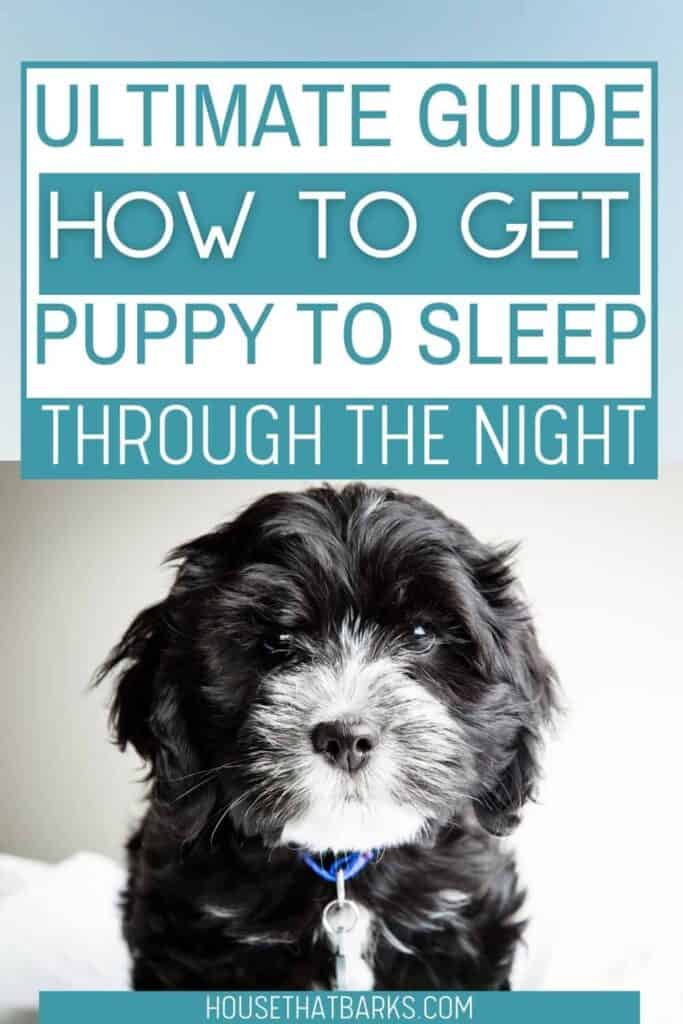
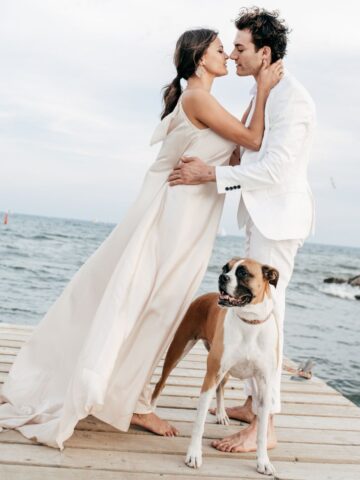
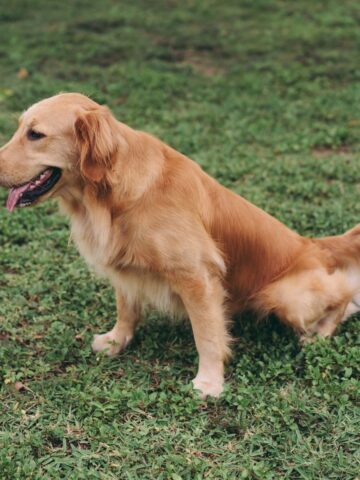

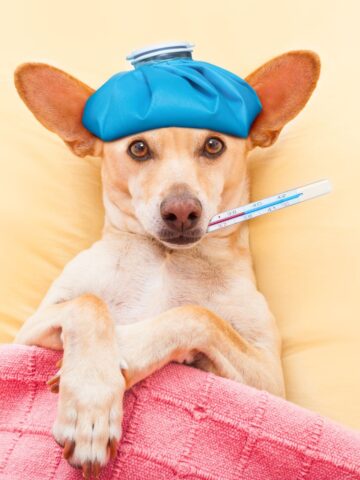
Leave a Reply